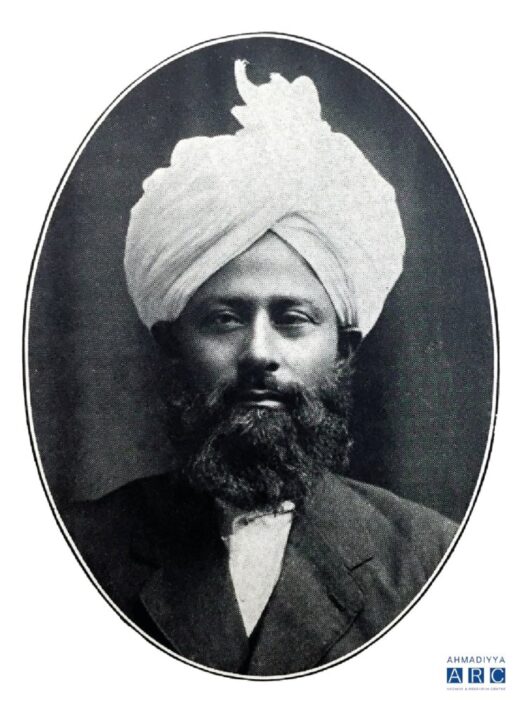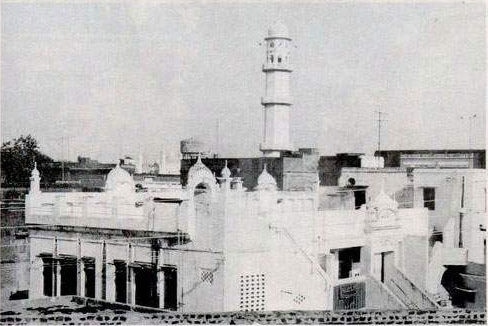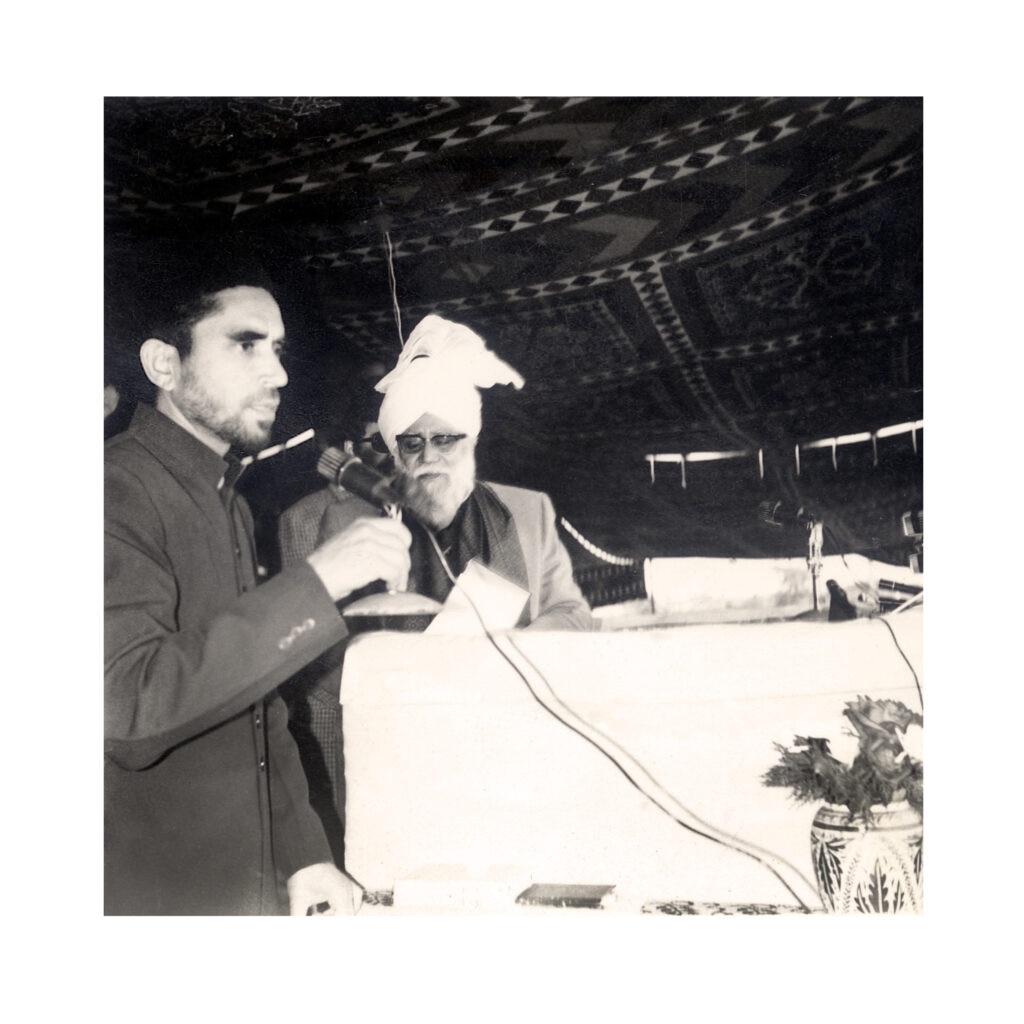Abdul Basit Shahid Sahib retired after remaining in service as a missionary of the Ahmadiyya Muslim Jamaat for almost four decades. He got the opportunity to serve in many parts of Pakistan and later in various African countries. Upon our request, he shared his memories of Jalsa Salana which span over eight decades. His memories are like a time-lapse view of an institution that was budding when he started his experience of it and now sees it in full bloom. He sees it as no less than a miracle – and a miracle it is.
Abdul Basit Shahid Sahib, Biographer of Hazrat Musleh-e-Maudra (Swanih Fazl-e-Umar, Vol. 3, 4 & 5)

I was born in Qadian in 1933. So if I go back to my earliest memories of Jalsa Salana, I find myself in the wintry days of the Decembers of the late-1930s and early-1940s in the blessed settings of my lovely hometown, Qadian – which, to my greatest fortune, is also the hometown of my beloved Messiah and Mahdias.
As with every child, the speeches and whatever else went on during the sessions remained beyond the grasp of my mind in early childhood. However, the atmosphere of Qadian in the days, or weeks or even months, leading up to Jalsa Salana and the days of Jalsa Salana itself were so electrified and so magnetised that the magic remains – even in the 89th year of my life – my earliest and fondest memory of Qadian.
I was very fortunate that my father, Abdur Raheem Diyanat Sahib, owned a convenience store which was situated in Ahmadiyya Chowk, by the gate of Dar-ul-Masih – right in the beating heart of Qadian. What then formed his shopfront had once been part of Hazrat Nawab Muhammad Ali Khan Sahib’s residence. It stood facing every person that walked towards Masjid Mubarak or actually, every person that walked from one part of Qadian to the other. It was very much a character on the stage of Qadian.
From this key location, it was always possible for us to know when Hazrat Musleh-e-Maudra was about to emerge from Qasr-e-Khilafat and walk, along with his entourage, towards the Jalsa Gah or any other part of Qadian. The crowd in the streets automatically seemed to stream itself into a queue as soon Huzoorra marched out in all his spiritual and majestic glory. We as children would see him from one part of the queue and then run off to a farther part and get another glimpse, and then another and then another. These glimpses of Huzoorra were the essence of Jalsa for us as very young children – the height of our delight.
Then, as I progressed through childhood, I started enjoying the main proceedings of Jalsa Salana, but only to the extent of Hazrat Musleh-e-Maud’sra speeches. I still can’t quite put a finger on it, but there was something rather extraordinary, very special and simply out-of-this-world about his speeches. They spanned over hours and even children of my age stayed and listened, or, to be more honest, watched him in awe as he delivered his speech. The elders that sat around us were mesmerised and would seem not to even blink during those hours-long speeches of Hazrat Musleh-e-Maudra.
It was many years later – when I started to make sense of the magnificent content – that I realised what made Hazrat Musleh-e-Maud’sra oratory so special: He spoke about complex religious and metaphysical matters but picked the most common of examples from the physical world that we live in, then related them so wonderfully well that they all fitted together excellently. What would finally emerge would be a concept ready to be grasped by intellects of all scales.
People have written a lot about many aspects of Hazrat Musleh-e-Maud’sra personality and a lot will be written, but what cannot be described in words and might never be described as such is the mysterious element that gave Hazrat Musleh-e-Maud’sra words that hypnotic quality. There have been great orators in the world.

If I stay in the South Asian Islamic world of Hazrat Musleh-e-Maud’sra time, I also had the opportunity to listen to fiery orators like Ataullah Shah Bukhari and Shorish Kashmiri and many others known for their oratory skills. I can say, hand on heart, their oratory skills came nowhere near Hazrat Musleh-e-Maud’sra. Yes, they knew the art, and yes, they were very skilled at rousing the crowds that sat and listened to them, but then this is not what the oratory skill is all about. The essence of public speaking remains the substance therein, and if that is lacking then however good the speech may be and however long it may keep your audiences seated, it is of no practical good.
I remember listening to Ataullah Shah Bukhari on several occasions; he would start reading a naat (ode to the Prophetsa) and would go on reciting it for hours; he would start telling a joke and would go into such details to make it understood that the very joke itself would be left gasping for life. On the other hand, Hazrat Musleh-e-Maud’sra words just rolled off the tongue – from complicated philosophical issues to humorous anecdotes; from a supernatural phenomenon to an incident from a street in a nearby village – it all just fell into place. And these words would fill the hearts of those who filled the streets of Qadian during Jalsa days.
One memory of Jalsa Salana from my childhood and my youth days that I have never forgotten and will never forget is the melodious tilawat of the Holy Quran by Hazrat Musleh-e-Maudra. One would desire for it to continue and never come to an end. It was in such moments that the whole atmosphere of the Jalsa Gah and the whole of Qadian stood enchanted and desired to eternally remain so. This is what I mean that Qadian was a different piece of land – one from Heaven – during those blessed days of Jalsa Salana.
Since there was no bazaar in the Jalsa Gah like we have here in the UK or other Jalsas that happen in different parts of the world, what catered for the needs of those attending the Jalsa was the actual bazaar (market) of Qadian. Shopkeepers were hence expected to keep their shops open – my father being no exception. However, during the nights, he would pick up any piece of work that he could get his hands on and try to help voluntarily towards the operations of Jalsa Salana. My father would take pride and be humbled to narrate to us that he was in the Jalsa Gah when Hazrat Musleh-e-Maudra once said that he would not attend the next day’s Jalsa if the Jalsa Gah was not extended by the next morning. He always offered his gratitude to Allah that he was among those who stayed up all night to treat vast stretches of unkempt land, turning it into part of the Jalsa Gah, before the night could turn into day. All those who volunteered for this service saw Hazrat Musleh-e-Maud’sra expressed pleasure and Huzoorra awarded them with certificates. He kept the certificate very dear and near to his heart – before the mutiny of the partition snatched it away from him.

The first Jalsa duty I remember was of counting rotis and piling them up. A few years later, I served in pot-washing also but readers must remember that those were not the days when pot-washing machines were used, nor were the pots so easily washable as they are today. All food and water was consumed in pots and glasses made of raw clay. Oil from the food consumed in them would freeze in the cold weather – pair that with the cold water that we tried to wash it with and the greasy residue would get even harder and, with soap being a rare commodity, it was only our nails or handfuls of straw and rough soil that came in handy to achieve a task (although it was never fully achieved). And talking of hot water, I must remind you that I remember when hot water became an option, yet remained a luxury owing to its scarcity for many years. Otherwise, most of the duties where water was involved were carried out with cold water only – very cold water, that is.
Now coming back to Ahmadiyya Chowk, we would get to see thousands of people meeting, greeting and embracing each other in the brotherly love that is unique only to our Jalsa Salana. I remember hearing someone asking another, “How are you here? Didn’t you say you would never come back to Qadian or the Jamaat?”
The reply has always remained etched on my mind: “Yes, I said so. But who can leave this lovely Jamaat? I had to come back!”
Let’s stay in the Ahmadiyya Chowk and add to it the nazms that people would start reciting and people would huddle around to listen. And through such crowds walked stalwarts like Mufti Muhammad Sadiq Sahibra, Mir Muhammad Ishaq Sahibra, Syed Sarwar Shah Sahibra, Maulvi Ghulam Ghaus Sahibra – what a bouquet of spiritually charged personalities was Qadian. People would start walking with these great personalities and listen to whatever they had to say. Even if they were answering someone’s question, others would just join and listen carefully from that point onwards.
Then happened the painful incident of the partition. We had to move to Lahore and then Rabwah. I remember just how strange it seemed when the first Jalsa Salana was meant to happen in the town that then looked like nothing more than a wilderness. The water in Rabwah, in its early days, was hard-water and not suitable for drinking. It had to be brought in in tankers, yet had to be consumed very parsimoniously. Every drop was precious.
But these tankers that brought water, also roused clouds of dust – quite naturally for a land that had for centuries been barren – that made visibility and breathing a challenge in their own right. But as soon as the institution of Jalsa Salana was transplanted in Rabwah, it took root almost immediately and started to flourish.
I was very fortunate to serve with Maulana Abul Ata Sahib and Maulana Abdul Maalik Khan Sahib when they were the muntazims of the stage programme respectively. I was blessed to assume this responsibility in the time of Hazrat Khalifatul Masih IIIrh. Sometimes, urgent announcements had to be made even during Huzoor’sra address. I remember how we would muster up the courage, walk up to the rostrum and then Huzoorra would immediately notice and allow for the announcement to be made. I have a photograph from one such occasion which always reminds me of Jalsa Salana of Rabwah.

By the grace of Allah, I personally witnessed when Hazrat Musleh-e-Maudra first mentioned how voice amplifiers were being used in large gatherings to take the speaker’s voice farther than it could naturally reach. I remember when he launched a scheme for funds to be raised for such an audio amplifying system. And I also remember how a devoted Ahmadi had arranged for the system to be purchased and installed. I remember how that technology was used to amplify the words of Hazrat Khalifatul Masih.
Being a witness to that and being a witness to the heights that MTA has seen humbles me and makes me ever so thankful to Allah to let me live through so many episodes of Jamaat’s success story.
You asked me about my early memories of Jalsa Salana. From what I have mentioned above, I now look back and think: Could I, or anyone else around me for that matter, have ever imagined that Jalsa Salana would see such heights of prosperity? I don’t think so. Today when I hear my children and other people talk about “Jalsa car park” or issues related to it, I am left wondering how the Jalsa administration never had such a question for many decades, not to mention a whole nizamat. And this is just one example. I can go on comparing so many aspects that point to huge leaps that Jalsa Salana has made under Khilafat-e-Ahmadiyya and as a sign of the Jamaat’s progress.
I would like to conclude by reminding myself and others that the blessings of Allah on the Jamaat are such that being grateful enough is something we need to always be watchful about. Although we can never thank Him enough, we cannot fall short of our best attempts. One way of doing so is staying behind our beloved Imam, Hazrat Khalifatul Masih Vaa.
The secret to every success lies in staying behind the Imam.


Brilliant! Absolutely wonderful to look back into the past. Abdul Basit Shahid Sahib Jazakomullah ahsanljaza!